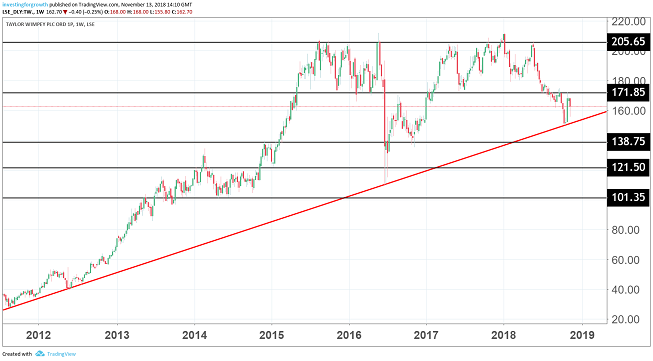Is Taylor Wimpey and its 11% dividend yield still a top Brexit play?
13th November 2018 14:10
by Graeme Evans from interactive investor
Taylor Wimpey shares appear dirt cheap and offer a double-digit prospective yield, but these can also be huge red flags. Graeme Evans investigates.

Today's contrasting share price fortunes for blue-chip high-yielders Vodafone and Taylor Wimpey has further highlighted the scale of Brexit uncertainty hanging over the housebuilding giant.
Updates from both Vodafone and Taylor Wimpey reassured income seeking investors over the pair's attractive dividend prospects. But while the mobile phone giant surged 7% to the top of the FTSE 100 Index, Taylor slid by as much as 4% as it continued the disappointing performance seen in 2018.
Despite its promise to return £600 million to shareholders next year, the stock has been dragged down by fears that political and economic uncertainty will wreck demand. The company didn't help sentiment today when it said it was seeing some signs of customer caution, particularly in the South East.
Next year's volumes are expected to be broadly flat, but there's confidence that a new strategy will lead to significant growth from 2020. Taylor's long-time boss Pete Redfern also points out that the group has a strong balance sheet and high-quality landbank and is well placed to generate strong cash flows.
Against this background and with a price/earnings (PE) multiple of 8.5x, investors and analysts continue to ponder whether Taylor's 11% projected 2019 yield represents one of Brexit Britain's best-value stocks.
UBS certainly thought so last month, when they chose Taylor Wimpey and Howden Joinery as their two Brexit plays in the UK. They noted at the time that the housebuilder had seen its PE drop by a third between 2016 and their 2019 calendar year projection, despite growth of 22% in earnings per share.

Source: TradingView (*) Past performance is not a guide to future performance
The company set out a new strategy in May in which it pledged to increase returns on net operating assets to 35% and to boost landbank efficiency. It also wants to extend the affordability and accessibility of its homes to a wider range of customers.
From a shareholder perspective, the strategy will mean an enhanced ordinary dividend of about 7.5% of net assets, or at least £250 million a year across the cycle. A special dividend for 2019 of £350 million, or 10.7p a share, is expected to be paid in July next year.
- Two Brexit share tips and an 11.6% dividend yield
- Top 10 FTSE 100 income stocks yield an average of 7.1%
But as well as Brexit uncertainty, investors are fearful that government plans to end the popular Help to Buy equity loan scheme by March 2023 will impact the company. Taylor Wimpey said today it was pleased with tapering measures announced in last month’s Budget to manage the closure.
In the meantime, the UK housing market has remained stable through the second half of 2018. Customer demand for new build homes continues to be robust, underpinned by low interest rate and a wide choice of mortgage deals.
Taylor Wimpey's sales rate for the year to date is flat on a year earlier at 0.81 per outlet per week, with the current total order book up 12% on a year ago at 9,783 homes and equivalent to about £2.4 billion.
The company said: "We continue to monitor the potential risks around general customer confidence given the political and economic uncertainty.
"However, with a very real underlying need for more homes in the UK, the key drivers over the medium term for our customers will remain interest rates and mortgage availability, together with wage growth."
*Horizontal lines on charts represent levels of previous technical support and resistance. Trendlines are marked in red.
These articles are provided for information purposes only. Occasionally, an opinion about whether to buy or sell a specific investment may be provided by third parties. The content is not intended to be a personal recommendation to buy or sell any financial instrument or product, or to adopt any investment strategy as it is not provided based on an assessment of your investing knowledge and experience, your financial situation or your investment objectives. The value of your investments, and the income derived from them, may go down as well as up. You may not get back all the money that you invest. The investments referred to in this article may not be suitable for all investors, and if in doubt, an investor should seek advice from a qualified investment adviser.
Full performance can be found on the company or index summary page on the interactive investor website. Simply click on the company's or index name highlighted in the article.